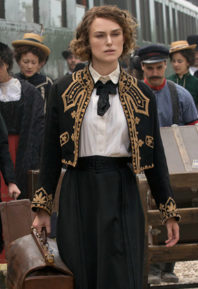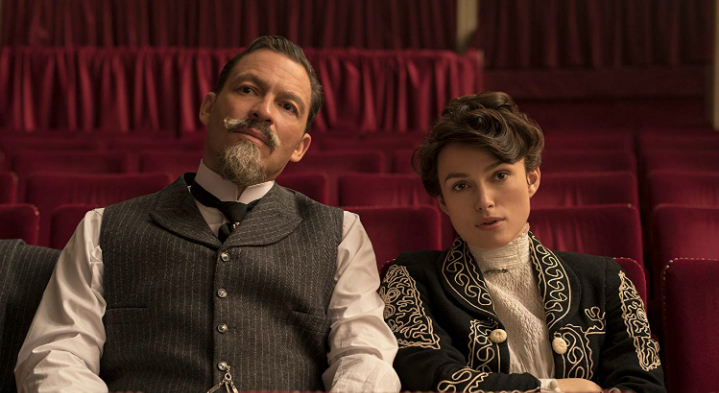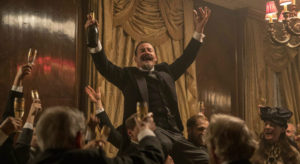
We’ve all heard the phrase, “If we don’t learn from history we’re doomed to repeat it.” And Wash Westmoreland’s Colette, a film that begins in the 1800’s, shows us that when it comes to equality, we’re still hung up on the same old issues. Westmoreland tells a biographical story about a young female writer that highlights misogyny, gender identity, and sexual repression issues in our past to reveal we’re not as enlightened as we think.
Keira Knightley plays the eponymous Colette. She’s a young French country girl from a humble family too poor to scrape together a dowry. They’re overjoyed when a charming older man named Henry (Dominic West) comes along offering to take her off their hands. Bad move folks. Henry looks like a gentleman, but he is a slave to his vices; gambling, drinking, and womanizing. And when Henry, who works in publishing, discovers his wife’s talent for writing, it’s not long before he takes advantage of her.
Colette’s books secretly reveal the details of her life but under the guise of a character named Claudine. Readers can’t get enough of Colette’s stories, and the Claudine books become a sensation, turning the character into the era’s version of a Kardashian. But there’s a catch. Henry takes credit for the stories, gets all the praise, and receives the profits. While Henry galivants about living the rock star life, Colette blossoms in his shadow. In his absence, she explores her attraction to women and finds new outlets for self-expression.
Colette has a problem that hamstrings lots of biopics. The picture jumps through time so often that it doesn’t stay in any one place long enough to find a real groove. People pop in and out of Colette and Henry’s lives, but the only constant is each other. Knightley and West have enjoyable chemistry together, and their see-sawing power dynamic is compelling enough to sustain the movie. But the slices of life taking place around them feels like fluff; vapid moments of exposition to drive the narrative forward or hollow moments shoe-horned into the script.
The two leads turn in brilliant performances – at this point in their accomplished careers, it would be a shock if they didn’t. Henry comes off like a charming teddy bear with the heart of a viper. West’s role gives him enough room to run through a range of emotions, all of them enjoyable to watch. Henry’s drunken bravado and egotistical blustering are the defence mechanisms of an insecure and empty person. Henry could come off as far more villainous, but West finds the humanity in this broken man.
Knightley’s performance will have people talking. We watch the naïve country girl grow up and experience joy, frustration, and eventually outrage on her path to self-actualization. Knightley is believable as both a clueless teen and hardened woman. By the end, Colette has a steely-eyed self-assurance most people would kill for. And to top it off, the film closes with thundering monologue sure to show up in awards reel clips.
Colette looks great and sounds even better. To put it simply: Colette looks exactly like you expect a Keira Knightley period piece to look. You can easily get lost in the details of Michael Carlin’s production design. I couldn’t peel my eyes away from the ornate costumes, gaslit theatres, and vibrant outdoor settings. DP Giles Nuttgens’ smooth camerawork takes it all in, gliding and panning through each scene to let viewers soak up every inch of set dressing.
It’s Thomas Adès’ score, though, that captured my attention. It nimbly dances between joyful and melancholic, driving the mood of each scene throughout Colette’s journey. And during the film’s most intense moments I couldn’t help but lean in. When the tempo picks up, and the score intensifies, the music is reminiscent of a Hitchcock thriller. There were a couple brief moments where I half-expected a body to flop out of a wardrobe.
Westmoreland makes it painfully clear that we still struggle with the same issues Colette faced 130 years ago. As far as we’ve come in the past century, our “enlightened” society is still divided by notions of who we can and can’t love. 2018 can use more heroes – the inspirational kind, not the ones in capes. Colette, with her fierce spirit, stands tall in the face of today’s most divisive social issues. It’s upsetting that after all this time we still fight the same battles, but it gives me hope to know that a poor French girl born in 1873 grew up, found herself, and left a revered body of work that we still enjoy today. Just imagine what today’s iPhone generation can achieve.
- Release Date: 9/28/2018



